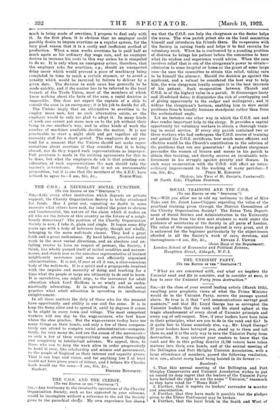THE C.O.S.: A NECESSARY SOCIAL FUNCTION. [To THE EDITOR OF
THE " SPECFATOR."1
SIR,—Like every other institution which depends on private support, the Charity Organization Society is to-day straitened for funds. May I point out, repeating no doubt in some measure what others have said, for indeed the point is obvious and fundamental, the nature of the claim which it makes on all who see the future of this country as the future of a neigh- bourly democracy? The position of the Charity Organization Society is now, I take it, plain and single. It began some fifty years ago with a body of believers largely, though not wholly, belonging to the more well-to-do classes. They had a great faith and a great enthusiasm. By hard labour, practical social work in the most varied directions, and an absolute and un- failing resolve to have no respect of persons, the Society, I think, has wholly purged itself of initial crudities and narrow- nesses, and stands now as the non-class representative of trained neighbourly assistance and wise and efficiently organized administration. It is not, if ever at all it was, a class-conscious body of the well-to-do. It is a spirit and a propaganda inspired with the impulse and necessity of doing and teaching for a time what the people at large are ultimately to do and to learn. It is correlative, one might urge, to the movement for adult education which Lord Haldane is so wisely and so enthu- siastically advocating. It is spreading in detailed social practice what adult education is spreading in intellectual enlightenment.
In all these matters the duty of those who for the moment have opportunity and ability is one and fhe same. It is to keep the flame alive and to spread it, until by degrees it comes to be alight in every town and village. The most competent workers will one day be the wage-earners, who best know where the shoe pinches. But the wage-earners to-day have too many things on their hands, and only a few of them compara- tively can attend to complex social administration—compara- tively, for very many do, and are the cream of the movement— as only a few of them comparatively can attend thoroughly and completely to intellectual advance. We appeal, then, to those who can to keep the work alive in order progressively to hand it over, like scholarship and science and government, to the people of England as their interest and capacity grows. That is our hope and vision, and for anything less I at feast would not have given years of labour, and I believe Sir Charles Loch would say the same.—I am, Sir, &c., •


































 Previous page
Previous page